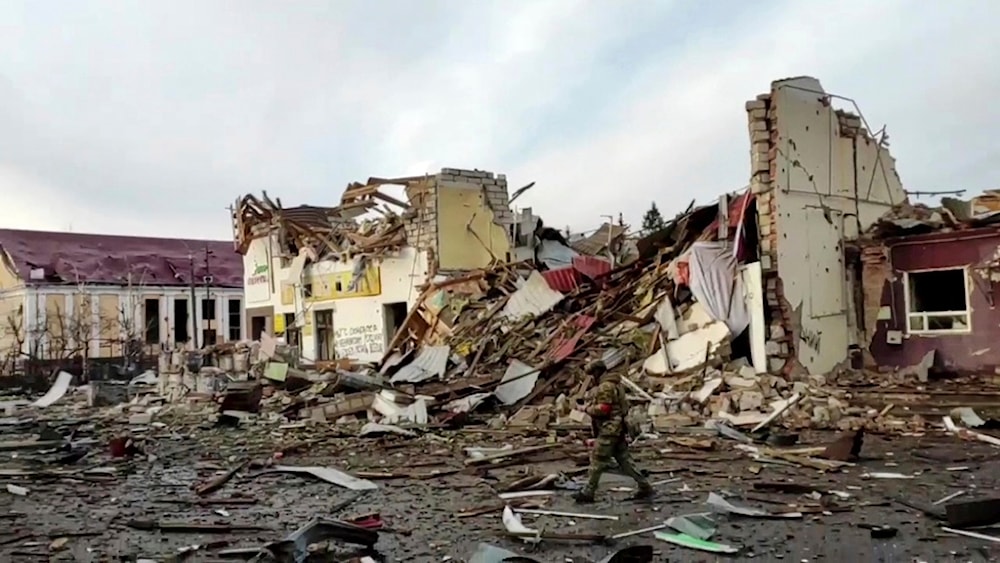Lost ground, lost soldiers: Ukraine's Kursk offensive divides nation
The surprise assault in August 2024 marked the largest incursion into Russian territory since World War II.
-

In this photo taken from a video distributed by the Russian Defense Ministry Press Service on Thursday, March 13, 2025, a Russian soldier patrols an area in Sudzha in the Kursk region of Russia, after it was taken over by Russian troops. (Russian Defense Ministry Press Service via AP)
Reuters on Saturday reported on growing uncertainty and debate in Ukraine following its military withdrawal from Russia's Kursk region — a bold cross-border incursion that, while initially successful, has come at a heavy cost for some Ukrainian families and soldiers.
Mariia Pankova last messaged her close friend, Pavlo Humeniuk, a 24-year-old combat engineer in Ukraine's 47th Magura brigade, in December. Days later, she learned from another soldier that Pavlo had gone missing near the village of Novoivanivka in Kursk on December 6. Since then, there has been no information about his fate.
Pankova, 25, continues to search online for any news. "I'm just not sure it was worth it," she said through tears, remembering how she and Pavlo bonded over their love of hiking. "We're not invaders. We just need our territories back, we do not need the Russian one."
Ukraine's military General Staff stated that the offensive into Kursk aimed to increase pressure on Moscow, prevent cross-border attacks, and divert Russian forces from other fronts. The operation, they claimed, "achieved most of its goals."
The Kursk gamble
The surprise assault in August 2024 marked the largest incursion into Russian territory since World War II. Ukrainian forces captured over 1,300 square kilometers of land, advancing largely unopposed in the early stages. However, as the operation progressed, the offensive force struggled with logistics and troop numbers.
"From the very beginning, logistics was seriously complicated because as we entered the Kursk region, we ensured sufficient depth but we did not ensure sufficient width," said Serhiy Rakhmanin, a Ukrainian lawmaker and member of the parliamentary defense committee.
Russian reinforcements, including elite units and top drone operators, later turned the tide. Ukrainian military bloggers reported that Moscow had deployed additional forces, supported by troops from the DPRK. "They not only increased the number of their group opposing our military, but they also improved its quality," Rakhmanin added. Russian President Vladimir Putin has not acknowledged the involvement of DPRK forces.
Read more: EU to offer voluntary military aid to Ukraine, keep pressuring Russia
Ukraine confirmed on March 16 that it had retreated from the city of Sudzha, prompting questions about the strategic value of the operation. Some Ukrainian troops and observers have begun to express doubts.
"We should not have started this operation at all," said Oleksii Deshevyi, a 32-year-old soldier who lost his hand in Kursk, speaking from a rehabilitation center in Kiev.
President Volodymyr Zelensky acknowledged the military's difficult position in Kursk but denied claims by both Putin and US President Donald Trump that Ukrainian forces were encircled. US intelligence assessments also confirm that Kiev's troops are not surrounded.
Ukrainian analysts now say Russia may be preparing a larger offensive in the neighboring Sumy region, following new Russian incursions confirmed by Valery Gerasimov, Russia's chief of General Staff. He reported significant Ukrainian losses in Kursk.
Costly gains
Ukraine's General Staff maintained that the operation's goals extended beyond holding territory, including "control over the territory of the Russian Federation, exhaustion of the enemy, destruction of its personnel and pulling back its reserves."
They claim nearly 1,000 Russian soldiers have been captured, some later exchanged for Ukrainian prisoners. The offensive, they added, forced Moscow to form three new military groupings, totaling around 90,000 troops and 12,000 DPRK servicemen — though Reuters could not independently verify these numbers.
Read more: Russia’s ‘Operation Flow’ used pipeline to infiltrate Ukrainian lines
Military analyst and former chief of Ukraine's General Staff, Viktor Muzhenko, had warned early on against such high-risk moves, writing in August 2024 that Ukraine should "focus on defending its key territories, avoiding unpredictable risky operations that could divert attention from main threats, and choose forms and methods of using troops that are adequate to their capabilities."
Others argue the operation dealt a blow to Russian forces and showed Ukraine's offensive capability. On March 12, Commander-in-Chief Oleksander Syrskyi said the assault had diverted and eliminated some of Russia's top troops. Rakhmanin noted it gave Ukrainians a needed morale boost after territorial setbacks in 2024.
As discussions of a negotiated end to the war gain momentum, Pankova remains wary of any agreement that might compromise Ukraine's hard-fought ground. "Every time that someone tries to, let's say, sell some piece of Ukraine, they just have not to forget what we already gave. How many lives our people gave for that," she said, adding that she is considering joining the armed forces herself.

 5 Min Read
5 Min Read









